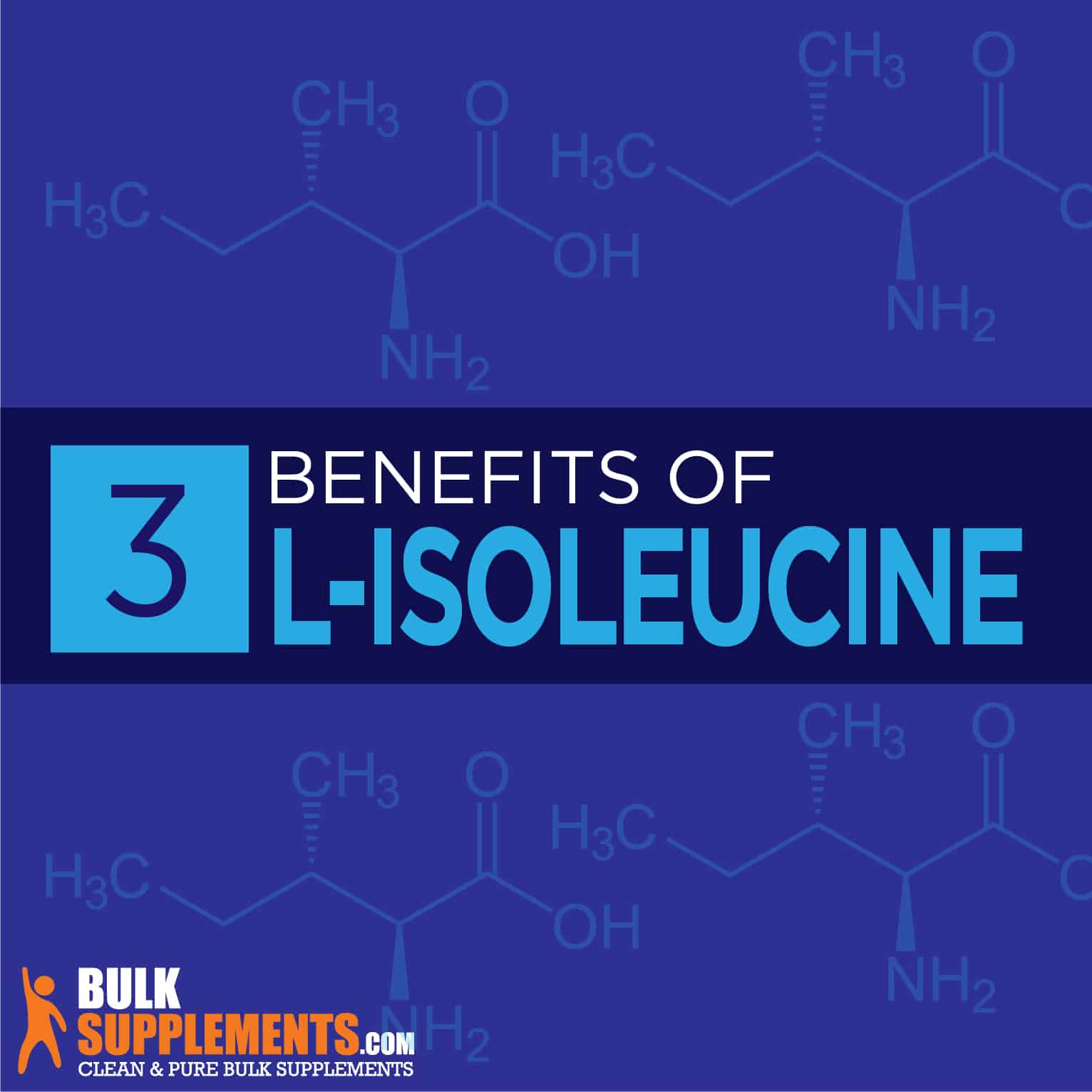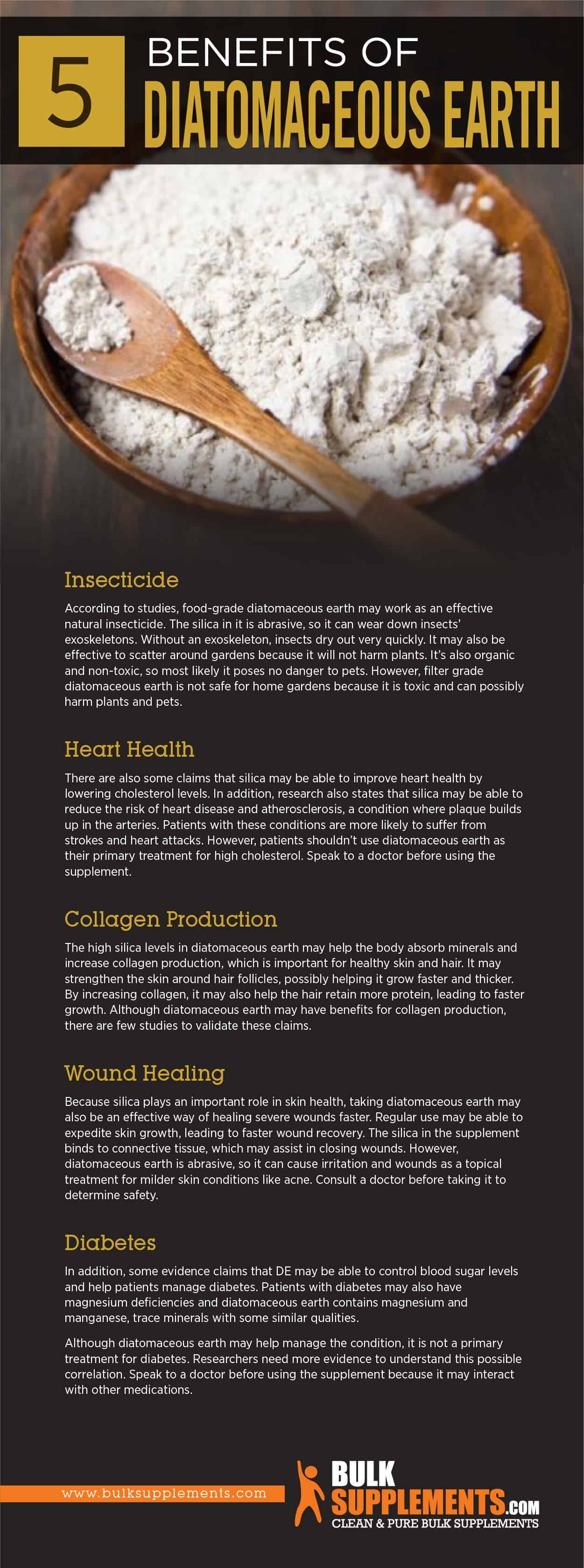Diatomaceous Earth: Benefits, Side Effects & Dosage

Diatomaceous Earth
What Is Diatomaceous Earth (DE)?
Diatomaceous earth (DE) comes from sand naturally extracted from the Earth. It’s mainly comprised of fossilized remains from small organisms, such as algae. Over millions of years, the algae fossilize and form abrasive crystals with a sand-like texture. Diatomaceous earth is made up of small particles called diatoms. The diatoms contain mainly silica, a trace element that plays an important role in forming connective tissue throughout the body.
Diatomaceous earth has a wide range of uses. For example, manufacturers often sell it in bulk as an insecticide because it has abrasive particles that may be effective for killing insects. It may also help patients manage diabetes and reduce the risk for heart problems. Research states that the silica it contains may also increase collagen production for healthy skin and hair.
In addition to silica, DE contains a number of key minerals that the body requires for healthy functioning. It has high levels of magnesium, calcium, iron, sodium and manganese. These minerals play a crucial role in maintaining overall health.
Types of Diatomaceous Earth
Because it has a wide range of uses, there are a number of different sources of diatomaceous earth. The two main types are food-grade and filter grade. Food-grade diatomaceous earth contains a lower amount of silica crystals (usually around 2 percent), making it safe to use around plants and animals. However, filter grade diatomaceous earth contains a lot more silica (often around 60 percent), meaning it is much more abrasive.
If people consume it, filter grade DE is toxic because it enters the bloodstream and wears down tissue in the digestive tract. People should only use it for industrial purposes, not for gardening since it can kill plants and it is dangerous for pets. In addition, it can cause severe lung and skin and lung irritations if patients inhale it or use it as a topical treatment.
Benefits of Diatomaceous Earth
Diatomaceous earth has a wide range of benefits, from skin and heart health to pest control. Here are some of the most common uses of the substance:
Insecticide
According to studies, food-grade diatomaceous earth may work as an effective natural insecticide. The silica in it is abrasive, so it can wear down insects’ exoskeletons. Without an exoskeleton, insects dry out very quickly. It may also be effective to scatter around gardens because it will not harm plants. It’s also organic and non-toxic, so most likely it poses no danger to pets. However, filter grade diatomaceous earth is not safe for home gardens because it is toxic and can possibly harm plants and pets.
Heart Health
There are also some claims that silica may be able to improve heart health by lowering cholesterol levels. In addition, research also states that silica may be able to reduce the risk of heart disease and atherosclerosis, a condition where plaque builds up in the arteries. Patients with these conditions are more likely to suffer from strokes and heart attacks. However, patients shouldn’t use diatomaceous earth as their primary treatment for high cholesterol. Speak to a doctor before using the supplement.
Collagen Production
The high silica levels in diatomaceous earth may help the body absorb minerals and increase collagen production, which is important for healthy skin and hair. It may strengthen the skin around hair follicles, possibly helping it grow faster and thicker. By increasing collagen, it may also help the hair retain more protein, leading to faster growth. Although diatomaceous earth may have benefits for collagen production, there are few studies to validate these claims.
Wound Healing
Because silica plays an important role in skin health, taking diatomaceous earth may also be an effective way of healing severe wounds faster. Regular use may be able to expedite skin growth, leading to faster wound recovery. The silica in the supplement binds to connective tissue, which may assist in closing wounds. However, diatomaceous earth is abrasive, so it can cause irritation and wounds as a topical treatment for milder skin conditions like acne. Consult a doctor before taking it to determine safety.
Diabetes
In addition, some evidence claims that DE may be able to control blood sugar levels and help patients manage diabetes. Patients with diabetes may also have magnesium deficiencies and diatomaceous earth contains magnesium and manganese, trace minerals with some similar qualities.
Although diatomaceous earth may help manage the condition, it is not a primary treatment for diabetes. Researchers need more evidence to understand this possible correlation. Speak to a doctor before using the supplement because it may interact with other medications.
SEE ALSO

L-Isoleucine: Benefits, Side Effects & Dosage

Side Effects of Diatomaceous Earth
There is not enough reliable information to determine if diatomaceous earth is completely safe. Researchers have not concluded any definite side effects. However, inhaling it may cause severe respiratory complications, especially if the patient already has respiratory problems. For example, it may worsen conditions like asthma and chronic obstructive pulmonary disease (COPD). The supplement is also very abrasive, so it may cause irritation and wounds on the skin as a topical.
Pregnancy & Breastfeeding
There is little research to validate its safety profile for pregnant patients. Avoid this product during pregnancy or breastfeeding to be safe.
The Bottom Line
Diatomaceous earth is a sand-like substance made from fossilized algae. It has a wide range of uses, from insecticides and garden care to potentially managing diabetes and high cholesterol.
Diatomaceous earth contains high levels of silica, which is important in forming connective tissue throughout the body. Silica stimulates collagen production, which can help wounds heal faster and it may also help promote hair growth.
Furthermore, diatomaceous earth may have benefits for heart health. Studies show that it may also lower cholesterol levels, potentially reducing the risk for a wide range of cardiovascular problems. It may also be able to help the body regulate blood sugar levels and possibly help control diabetes.
There is not enough evidence to determine if the supplement is completely safe and it may cause side effects. Inhaling it can be very dangerous to the lungs. It can cause severe scarring and breathing issues, especially if the patient already has respiratory problems. Always consult a doctor before using diatomaceous earth as a dietary supplement.



